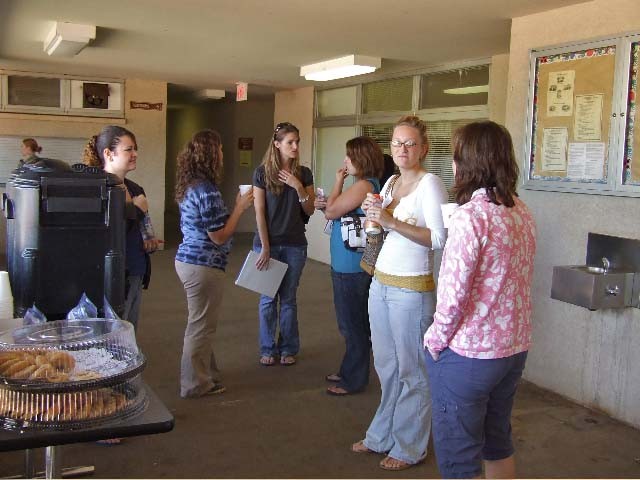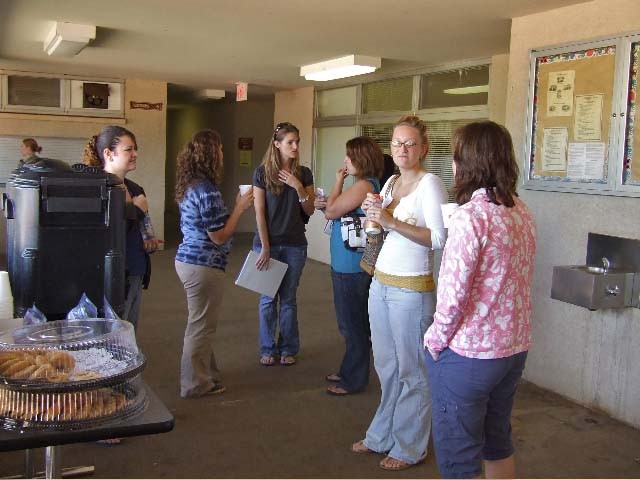"We've been separated for 15 months. In that time, we've each established new routines, assumed new responsibilities and endured new stresses," said Lisa McCaffrey, wife of Col. Todd McCaffrey, whose 2nd Stryker Brigade's 4,000 Soldiers returned home last month from Iraq. "Now we need to reintegrate our lives, our routines and responsibilities," she said.
Last November, to help prepare for the surge of homecomings, McCaffrey and some key leaders of the 2nd Stryker Brigade Combat Team's rear detachment rear detachment, family groups, Army family services and healthcare providers, and community leaders began to meet informally, to plan a series of workshops to help spouses and children prepare for the return of their Soldiers.
The group put together nine different workshops and classes, billed as the Family Strong Series. The classes, led by Schofield Barracks, Tripler, and family support service providers, were conducted over eight days in December, January and February. More than a hundred Soldier spouses and children attended the classes.
Attendees learned practical tips and insights on coping, building social networks and getting to know the Soldier, spouse and parent in their lives. Other courses focused on common post-combat reactions, health concerns, stress reduction, spiritual resiliency, and changes in finances and jobs.
The program organizers have continued to meet weekly at the Schofield Barracks Health Clinic, to share information and to coordinate other activities to support Soldier families.
"I know of no other installation in the Army, where community service providers and key leaders in the Army Family community have come together in such a way, to share information and work together to improve how we serve Soldiers and their Families," Col. Michael Brumage, Schofield Barracks Health Clinic commander, said.
As the nation has also continued to mobilize its Reserve and National Guard units to fight the Global War on Terrorism, fences that once separated the local community from the active Army community have begun to disappear.
Two key volunteers in this Family Strong coalition have been U.S. Attorney for Hawaii Ed Kubo and his wife, Tammy. Kubo's son, a Reservist with the 100th Battalion, 442nd Infantry, is on his first deployment to the Middle East. The Kubos are actively involved in the battalion's Family Readiness Group and in sending "care packages" to Hawaii Reservists deployed to the Middle East.
Kubo has also been concerned about Schofield Soldiers and helped establish a Wounded Warrior Support Program. While doing so, Kubo found himself working with spouses and parents of active Army Soldiers.
"Having been an Army family member for over 20 years of my life, I know how extended deployments to a war zone affect Soldiers and their families," said Kubo, whose father served during the Korean and Vietnam Wars.
Mrs. Kubo said, "Our son is doing his duty for our country, and we are so very proud of him. We feel so much a part of the Army Family that we will do all we can to support and assist our Soldiers and Army Families, by helping this valuable Family Strong Hawaii program."
The Kubos recently set up a model website, www.familystronghawaii.com, for
announcements and web links to the diverse programs and events now being offered to all Army Soldiers and family members, active duty and reservists, all together on a single site.
"The Army offers a wealth of services to Soldiers and family members, but they are
sponsored by different Army organizations which operate pretty much independently of the others," Kubo said. "We'd like the website to be like a local marketplace, where people can easily learn about all these wonderful activities and events, so they can take advantage of them. We invite people to submit information about their programs."
"The Family Strong Series was formed to link a variety of existing and newly tailored
programs to serve Army Families and Soldiers," said McCaffrey. "We are focusing on building support packages for leaders of small units to meet their soldier's unique needs."
The group has continued to solidify and has named itself Pohai Pulama, while taking other steps to establish more formal ties with other Army organization. Its name, Pohai Pulama, means a caring circle of people. Spouses from 2nd Stryker Brigade Combat Team take a quick break between Family Strong Series classes at the Main Post Chapel Annex, Schofield Barracks.
--30--


Social Sharing